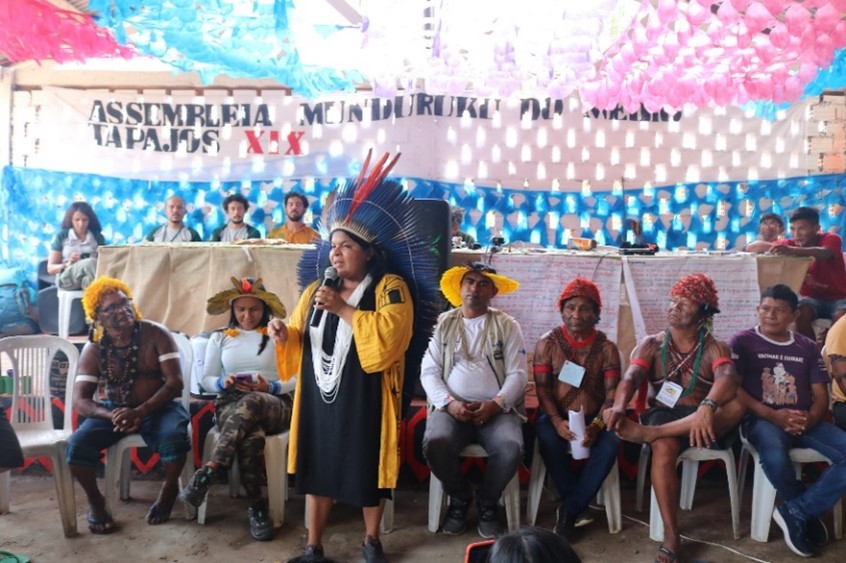
Brasilia, 10 November 2023 - In recent weeks, the United Nations Office on Drugs and Crime (UNODC) in Brazil has supported and participated in two assemblies of the Munduruku people on indigenous lands affected by the presence of illegal gold mining, in south-west Pará. As traditional spaces for debate and decision-making for the Munduruku, the assemblies brought together chiefs, leaders, government representatives and partner institutions, including UNODC Brazil.
Also present at the discussions were the Minister for Indigenous Peoples, Sônia Guajajara; the Secretary for Indigenous Health (SESAI) of the Ministry of Health, Weibe Tapeba; and the State Secretary for Indigenous Peoples of Pará, Puyr Tembé.
The support for the two Munduruku assemblies is part of the consultation stage with the communities to jointly build alternative development plans as a way of reducing the incidence of illegal mining in the region and preventing crimes related to the activity - among them human trafficking and forced labour. The points raised during the discussions will be consolidated in order to support future technical assistance actions for the state and interventions in cooperation with partner institutions and organisations.
In this context, UNODC Brazil's Tapajós Project envisages a series of actions aimed at reducing human trafficking for the purpose of slave labour in gold mining in the Tapajós river basin region, in the state of Pará. These include promoting sustainable value chains that act as economic alternatives to gold mining; and supporting the implementation of crime prevention strategies and improving the living conditions of workers and populations affected by the activity.
The first Munduruku general assembly supported by the Tapajós Project was held between 23 and 27 October in the village of Poxo Muybu (TI Sawré Muybu), around 200 km from the urban centre of Itaituba (PA). The second, from 2 to 4 November, took place in the village of Novo Trairão (TI Munduruku), in the municipality of Jacareacanga (PA).
In addition to UNODC Brazil, the meetings were attended by Munduruku chiefs and leaders from the Middle and Upper Tapajós, local indigenous organisations and institutions such as the Ministry of Indigenous Peoples (MPI), the Federal Public Prosecutor's Office (MPF), the National Indian Foundation (FUNAI), the Pastoral Land Commission (CPT), ICMBio, the Indigenous Missionary Council (CIMI), the Coordination of Indigenous Organisations of the Brazilian Amazon (COIAB), among others.
Tapajós Project
"Tapajós: A Prevalence Project to Reduce Forced Labour in the Gold Mining Sector in the State of Pará, Brazil" has been implemented since 2021 by UNODC Brazil, as part of its mandate to assist countries in implementing the UN Trafficking in Persons Protocol, with funding from the United States Department of State's Office to Monitor and Combat Trafficking in Persons (JTIP/PEMS).
The first phase of the Tapajós Project aimed to develop a better understanding of forced labour conditions in the gold mining sector in the Tapajós river basin, Pará. Three studies were produced to inform future national efforts to combat human trafficking. Starting in the second half of 2023, phase II foresees the implementation of evidence-based interventions - co-produced with local partners - to reduce human trafficking and slave labour, as well as promoting alternative development in the region.